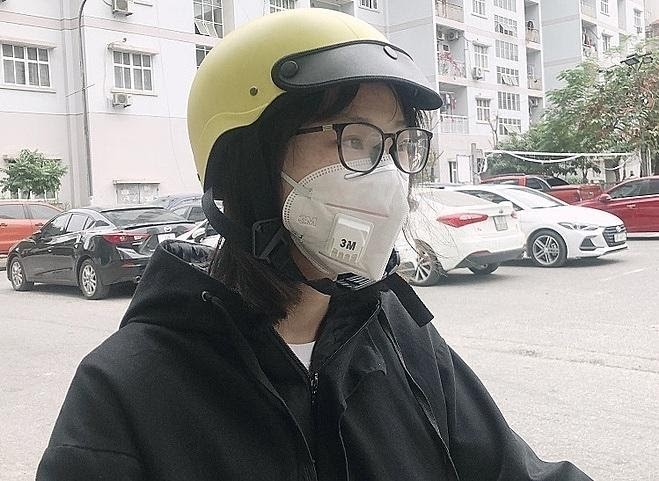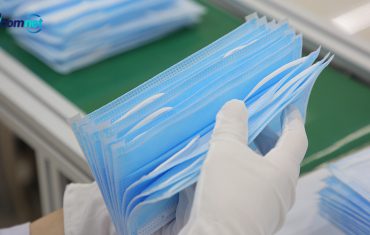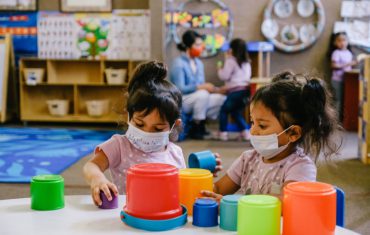Standing in front of the face mask sales, 29-year-old Mai in Cau Giay district does not know which one to choose for traveling in the polluted air.
She said that she often uses medical masks that cost only 2,000 VND each. Currently, the city’s environment is polluted, she wants to buy thicker face masks that can filter out fine dust.
Three people who are choosing a face mask at the shop Ms Mai is buying also share the same wish. The general requirement is that a face mask of good quality, clear origin, filters out micro dust particles and is affordable.
The price of face masks on the market has many segments. Cheap price from 15,000 to 50,000 VND for a regular or 3M, high-end about 500,000 – 700,000 VND originating from the US, Korea …
Holding a 3M face mask, the seller introduced this as the best-selling item, reaching N95 index filtering all microscopic particles up to 0.3μm in size, bacteria and viruses. However, 3M can only be used once. Some other masks, such as Cambridge Mask, are resistant to most harmful gases. Masks made of activated carbon; many layers are dustproof with super fine size …
Mr. Nam, after discussing with Ms. Mai as two accidental customers, also bought 10 thickest masks. . He chose a face mask with filter valve so that he could wear it for a long time without getting stuck and uncomfortable. Use for two days each, if the mask is dusty or turns yellow, use it for one day.

3M masks prevent ultrafine dust, but can only be used once. Photo: Thuy An.
5 safe masking factors
Mr. Doan Ngoc Hai, Head of Occupational and Environmental Health, said that the mask meets antibacterial standards, removes viruses, bacteria … must meet 5 requirements including ability dust filter, face fit, ventilation, aesthetics and weight.
To achieve these 5 factors, the manufacturer’s mask is designed with many layers of filter cloth, filtering all fine dust, toxic smoke … Some models add a layer of activated carbon that neutralizes toxic gases and dust. dirt and bacteria pass through. However, there are currently no agencies assessing, verifying or announcing the quality of masks, making users confused.
Doctor Vo Cong Minh, Department of Ear, Nose and Throat, Hospital of the University of Medicine and Pharmacy, Ho Chi Minh City, said fabric masks, normal medical masks, cannot filter small dust from fine dust and ultrafine dust. Medical masks only limit 30-40% of dust and are unable to protect the body from air pollution.
“Should use appropriate masks, ensure PM2.5 fine dust, prevent bacteria and harmful substances”, Dr. Minh advised. These masks use material that can filter out small particles. In particular, N95 or N99 masks containing activated carbon can help you avoid direct exposure to inhalation of polluted air into the airways.
N95 mask means 95% filter, N99 is 99% filter of dust in the air, including ultra-fine dust. This type of respirator is recommended by the US Centers for Disease Control and Prevention for use in cities with air pollution.
In addition, consumers need to choose a face mask covering your face to block dirty air from entering the nose and mouth, allowing up to 5% of air to pass through the gaps. Use a face mask that has ventilation, the wearer must feel comfortable, breathe normally. Masks must cover all the nose and mouth, thus protecting the respiratory system effectively.
Face Masks must not be worn upside down because the outside surface is in direct contact with pollution or respiratory harm. Choose a face mask with clear origin to ensure effectiveness and avoid waste.
The Ministry of Health on December 14 recommends that people when going out on the street should use quality face masks and wear properly qualified masks to ensure tight, tight face. Should clean the nose, gargling in the morning and evening with normal saline, especially after going out. Rinse eyes with normal saline in the evening before going to bed. Limit the opening of windows and doors when the air is heavily polluted, especially when your home is near roads or in polluted areas.
Regularly clean living rooms and houses, clean and airy living environment. Limit use or replace charcoal, wood, and straw stoves with electric, magnetic, and gas stoves. Planting trees in and around the house helps to prevent dust and clean the air. Increasing nutrition to improve health and resistance.



